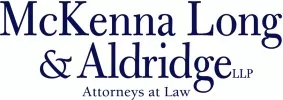A new draft REACH Regulation (http://www.euractiv.com/ndbtext/environ/ reach1.doc) released by the European Commission brings further changes to the text released for consultation in May 2003, and sets the scene for future heated discussions. For details on the new draft regulation, click here or see "New Draft REACH Proposal" below.
Our REACH seminars, in Washington, DC on October 15 and in San Francisco on October 21, are fast approaching. The program has become even more timely with the release of the new draft REACH Regulation. The program includes a discussion of how these revisions will affect, for better or worse, the regulatory burdens industry will face.
Full-Day Seminars:
Product Defense Under Existing and Future EU Chemicals Legislation
Wednesday, October 15: Washington, DC
Tuesday, October 21: San Francisco
Highlights:
Session I: Existing EU Chemicals Legislation
Even as it anticipates new chemicals legislation, industry continues to face numerous challenges created by the existing legislation. This session will identify both the nature and complexity of these challenges and strategies adopted by several companies to defend their products.
Session II: Future EU Chemicals Legislation
The proposed REACH regulation would impose significant new Registration, Evaluation, Authorization and Restriction provisions on the sale, import, manufacture and use of chemicals in the EU. This session will discuss how provisions of the new law may impact the ability of industry to develop and market its products. We will also suggest strategies for companies to consider in order to protect past and future product investments.
The European Commission's final REACH proposal is expected to be released at the end of October, and will be submitted to discussions in the European Parliament and the Council of Ministers. The new draft improves the previous text in certain aspects, but for most issues raised by commentators during the consultation period that ended July 10, few meaningful changes have been made. Some of the more noteworthy changes that have been made include:
- There is a direct reference to the precautionary principle in the text of the regulation, whose provisions are "underpinned" by this principle.
- Although the duty of care provisions remain in the text, companies will now be deemed to have discharged their duty of care if they comply with the provisions of the Regulation, or with provisions of Directives 67/548/EEC and 99/45/EC, where applicable. This is a significant improvement (in line with one of the comments submitted by McKenna Long & Aldridge LLP to the European Commission during the consultation period); without this change, a company complying with all of the applicable provisions of REACH could nevertheless violate the duty of care.
- Polymers are excluded from registration and evaluation, although the Commission maintains its discretion to later submit certain groups of polymers to registration.
- Chemical Safety Reports must only be submitted for the registration of substances manufactured or imported in quantities above 10 tons.
- Registrations shall be entirely handled by the Agency (instead of Member States), so it is now the Agency that will decide whether or not dossiers are complete.
- Safety Data Sheets must be transmitted through the supply chain.
- Downstream users must now perform a chemical safety assessment only if their use is not covered in the safety data sheet.
- The Evaluation provisions have been streamlined and require two types of evaluation: dossier evaluations and substance evaluations.
- Substitutability has became a mandatory criterion for the granting of authorizations. This is a potentially significant -- and troubling -- change.
- Substances in articles must only be registered if they are dangerous and intended to be released during normal and reasonably foreseeable use conditions. Unintended releases must be notified to the Agency.
- A Board of Appeal was established within the Agency.
The content of this article is intended to provide a general guide to the subject matter. Specialist advice should be sought about your specific circumstances.

